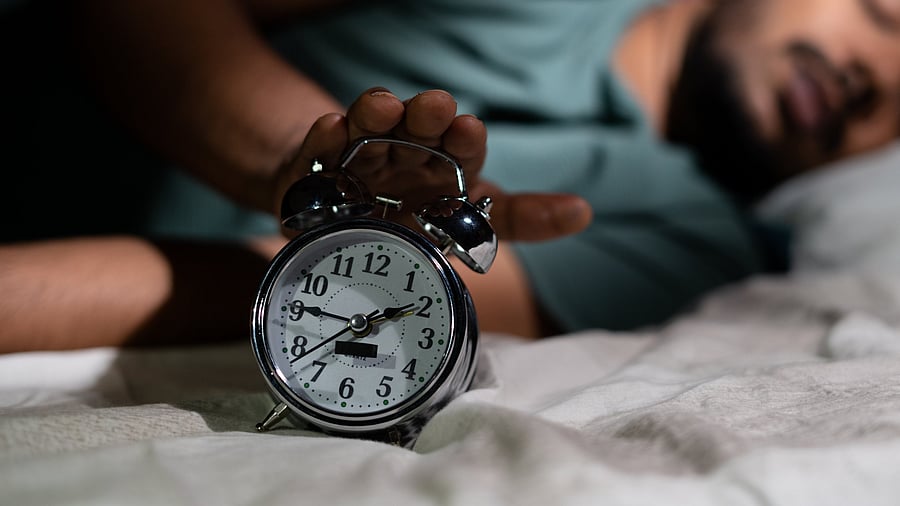
Representative image of a person sleeping
Credit: iStock Photo
Disrupted sleep is a common problem among IT professionals and students, say doctors. The problem is leading to the detection of serious ailments, in the 25- to 40-year age group. Earlier, they were common only among those aged above 50. World Sleep Day is observed on March 14.
C A Mathew, clinical head at a sleep clinic on M G Road, says in the last five years, “sleep cycles are most disrupted among 15 to 45-year-olds”, due to study or work deadlines. “Most youngsters are plugged into social media and watching reels till the wee hours of the morning,” he adds.
Mathew explains that each sleep cycle involves varied stages — transition to sleep, light sleep, deep sleep, and REM (Rapid Eye Movement). “One can experience these cycles around 3 to 4 times in a night.” To maintain ‘sleep hygiene’ (see box), one must follow some stringent steps, he adds.
Hypertension, risky heart health
Dr Subrata Das, head of department (internal medicine and diabetology) at a private hospital, says in the last five years, sleep deprivation has led to many in their late 20s and 30s, being diagnosed with hypertension. “Incidences of heart diseases are now common among 30- to 40-year-olds,” he adds.
Dr Das clarifies that there is a misconception that increased sleep can lead to an increase in weight. “Lack of sleep can worsen obesity, as it can affect one’s metabolic rate. Sleep has great impact on longevity and quality of life,” he says.
Dr Anand R Shenoy, consultant - interventional cardiology at a private hospital, points out that people who are obese suffer from obstructive sleep apnea, which can lead to several hypoxic episodes during sleep. “Such people suffer daytime somnolence, making them more prone to acute cardiac events in the future,” he explains.
Disruption of the circadian rhythm is leading to early onset of blood pressure, diabetes, rhythm disturbances of the heart, and eating disorders, among a host of other issues among 30- to 40-year-olds, share experts. “This is mostly seen among IT professionals, who work during the night and sleep in the morning hours,” Shenoy adds.
Eye issues on the rise
Dr Naren Shetty, ophthalmologist, says chronic sleep deprivation can lead to dry eyes, digital eye strain, blurred vision, and even increased glaucoma risk. “In the last five years, conditions like persistent dry eyes and early retinal stress are common among 20-year-olds and teenagers. Earlier, they were seen in individuals over 40,” he adds.
To maintain sleep hygiene
*7 to 8 hours of uninterrupted sleep
*Stop screen time 1-2 hours before bed
*No food or water 2 hours before bed
*No alcohol, coffee or caffeinated drinks 3-4 hours before bed
*Expose oneself to sunlight in the morning to regulate body clock
*Get up at the same time every day, even on weekends and vacations.
*Avoid working multiple nights in a row. Avoid extended work hours too.
For those on graveyard shifts
*Take a nap before the night shift to improve alertness.
*Use thick blinds to block out light during the day and turn off your electronic devices.
*Share your schedule with family members, to plan activities according to your schedule.
(Inputs by Dr Naren Shetty and C A Mathew)